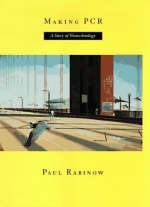
Making PCR
A Story of Biotechnology
Seiten
1997
University of Chicago Press (Verlag)
978-0-226-70147-9 (ISBN)
University of Chicago Press (Verlag)
978-0-226-70147-9 (ISBN)
A behind-the-scenes account of the invention of the polymerase chain reaction, which transformed the practice and potential of molecular biology. This book explores the culture of biotechnology as it emerged at Cetus Corporation in the 1980s, looking at its scientific, social and economic elements.
This is a behind-the-scenes account of the invention of one of the most significant biotechnological discoveries in our time - the polymerase chain reaction. Transforming the practice and potential of molecular biology, PCR extends scientists' ability to identify and manipulate genetic materials and accurately reproduces millions of copies of a given segment in a short period of time. It makes abundant what was once scarce - the genetic material required for experimentation. This study explores the culture of biotechnology as it emerged at Cetus Corporation during the 1980s and focuses on its distinctive configuration of scientific, technical, social, economic, political, and legal elements, each of which had its own separate trajectory over the preceding decade. The book contains interviews with the cast of characters who made PCR, including Kary Mullin, the maverick who received the Nobel prize for "discovering" it, as well as the team of young scientists and the company's business leaders. This book shows how a contingently-assembled practice emerged, composed of distinctive subjects, the site where they worked, and the object they invented.
This is a behind-the-scenes account of the invention of one of the most significant biotechnological discoveries in our time - the polymerase chain reaction. Transforming the practice and potential of molecular biology, PCR extends scientists' ability to identify and manipulate genetic materials and accurately reproduces millions of copies of a given segment in a short period of time. It makes abundant what was once scarce - the genetic material required for experimentation. This study explores the culture of biotechnology as it emerged at Cetus Corporation during the 1980s and focuses on its distinctive configuration of scientific, technical, social, economic, political, and legal elements, each of which had its own separate trajectory over the preceding decade. The book contains interviews with the cast of characters who made PCR, including Kary Mullin, the maverick who received the Nobel prize for "discovering" it, as well as the team of young scientists and the company's business leaders. This book shows how a contingently-assembled practice emerged, composed of distinctive subjects, the site where they worked, and the object they invented.
Paul Rabinow is a professor of anthropology at the University of California, Berkeley.
| Erscheint lt. Verlag | 10.11.1997 |
|---|---|
| Sprache | englisch |
| Maße | 14 x 22 mm |
| Gewicht | 255 g |
| Themenwelt | Naturwissenschaften ► Biologie ► Genetik / Molekularbiologie |
| Technik ► Umwelttechnik / Biotechnologie | |
| ISBN-10 | 0-226-70147-6 / 0226701476 |
| ISBN-13 | 978-0-226-70147-9 / 9780226701479 |
| Zustand | Neuware |
| Haben Sie eine Frage zum Produkt? |
Mehr entdecken
aus dem Bereich
aus dem Bereich
Buch | Hardcover (2012)
Westermann Schulbuchverlag
CHF 44,90
Schulbuch Klassen 7/8 (G9)
Buch | Hardcover (2015)
Klett (Verlag)
CHF 29,90
Buch | Softcover (2004)
Cornelsen Verlag
CHF 23,90


